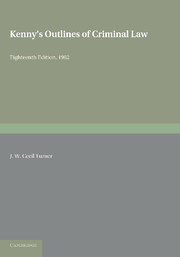Book contents
- Frontmatter
- Preface to the Sixteenth Edition
- Preface to The Seventeenth Edition
- Preface to the Eighteenth Edition
- Contents
- Index of cases
- Index to the principal statutes
- List of principal books cited
- BOOK I GENERAL CONSIDERATIONS
- BOOK II DEFINITIONS OF PARTICULAR CRIMES
- BOOK III MODES OF JUDICIAL PROOF
- BOOK IV CRIMINAL PROCEDURE
- Appendix I The meaning of ‘credit’
- Appendix II II Rules as to admission of evidence which reveals to the jury facts discreditable to the person accused
- Appendix III III Forms of indictment
- Index
Preface to the Sixteenth Edition
Published online by Cambridge University Press: 05 June 2016
- Frontmatter
- Preface to the Sixteenth Edition
- Preface to The Seventeenth Edition
- Preface to the Eighteenth Edition
- Contents
- Index of cases
- Index to the principal statutes
- List of principal books cited
- BOOK I GENERAL CONSIDERATIONS
- BOOK II DEFINITIONS OF PARTICULAR CRIMES
- BOOK III MODES OF JUDICIAL PROOF
- BOOK IV CRIMINAL PROCEDURE
- Appendix I The meaning of ‘credit’
- Appendix II II Rules as to admission of evidence which reveals to the jury facts discreditable to the person accused
- Appendix III III Forms of indictment
- Index
Summary
Kenny's Outlines of Criminal Law first appeared in 1902. The author declared that it was his aim to make the study of criminal law attractive to the reader, not only by supplying him with illustrative examples which might give vividness and reality to abstract legal principles, but also by tracing its connexion with the past, so as to explain the historical anomalies with which the law was still encumbered. His further purpose was to suggest the most important controversies, psychological, social and judicial, that the law of crime seemed likely to arouse in the future. Kenny's hopes and prophecies were abundantly fulfilled, and he lived to prepare twelve more editions, the last of which appeared in 1929. The book was founded on the course of lectures which the author had delivered for some twenty-five years before he wrote it and its immediate and enduring success could have been no surprise to anyone who had been his pupil. For Kenny had the faculty not only of looking widely but also of looking forward; he welcomed new ideas but, being a man with great practical experience in the law and possessed of shrewd common sense, he appraised them wisely. This broad and sane outlook, coupled with his remarkable oratorical gift of clear and charming presentation, enabled him to render work on criminal law an educational exercise as well as a vocational training. It was found, moreover, to be an attractive exercise; for it was never Kenny's fate to watch his audience dwindle as the academical year wore on. Yet the outstanding characteristic of Kenny's work which has won its most lasting distinction is that he saw the connexion between criminal law and all the social sciences more clearly than any English legal writer before him had done: he thus laid the foundation for the conception of criminal science as one composite subject of which criminal law is a part. For one who had the good luck as an undergraduate to be taught by Courtney Stanhope Kenny and subsequently, as a colleague, to enjoy his courteous friends ship and wise advice, it is an honour to be entrusted with the preparation of a new edition of his famous book.
- Type
- Chapter
- Information
- Kenny's Outlines of Criminal Law , pp. v - viPublisher: Cambridge University PressPrint publication year: 2013



